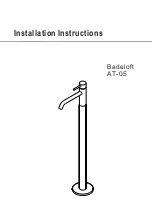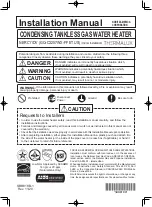
19
COMBINATION WATER HEATING AND SPACE HEATING APPLICATIONS –
COMMERCIAL MODELS ONLY
Commercial models may be used for space heating or combination space heating/potable water heating applications provided
the following requirements and recommended piping diagrams are carefully followed.
WARNING
The following instructions must be carefully followed to assure safe and reliable operation of the water heater. All piping
components connected to this water heater
must be
suitable for use with potable water. In Massachusetts, space heating
piping length must not exceed 50 feet. Toxic chemicals, such as those used for boiler treatment,
must not
be introduced
into potable water used for space heating. This water heater
must not
be connected to an existing heating system or
component(s) previously used with a non-potable water heating appliance. When the system requires water for space
heating at temperatures higher than required for other means, an ASSE approved mixing valve must be installed to temper
the water for those uses in order to reduce the scald hazard potential.
1. Only commercial models may be used for combination water heating/space heating applications. Check the rating plate
label to make sure “C” is in the model number designation. Residential models will not be covered under warranty for
water heating/space heating applications.
2. The maximum heat output that can be delivered to the space heating heat exchanger is 36,000 Btu/hr.
3. The temperature setting of the water heater thermostat must not exceed 160
°
F.
4. In combination space heating/potable water heating applications that require higher water temperatures than normally
used for potable water uses, an ASSE approved thermostatic mixing valve must be installed to temper the water for those
uses in order to reduce the scald hazard potential.
5. In order to assure adequate flow through the water heater, follow the recommended piping diagram and circulator
specifications (see Figure 6).
6. An expansion tank will be required in all space heating applications
7. A Y-type mesh strainer (#20 mesh screen) should be installed on the cold water inlet of the water heater to prevent
clogging of the fine mesh screen on the water heater cold water inlet connection.
8. A water softener must be used if the water supply has a tested hardness level above 10 grains of hardness.
9. All piping must be ¾” copper or larger.
10. All components must be suitable for use with potable water.
11. The water heater should be located as close as practical to the space heating heat exchanger.
12. A check valve should be located after the circulator(s) to prevent backflow during potable water demands.
13.
A heat exchanger may be required to separate the potable water from the space heating circuit in certain applications.
Figure 6
Summary of Contents for IGI-180R-10N
Page 7: ...7 EVERHOT IGI Model Series Dimensions Figure 1...
Page 14: ...14 Recommended Piping for a Basic Installation Figure 2...
Page 15: ...15 Recommended Piping for a Circulation System Figure 3...
Page 35: ...35 Horizontal Vent System Installation examples Figure 36...
Page 38: ...38 Vertical Vent System Installation examples Figure 40...
Page 39: ...39 Cut Line Template Figure 41...
Page 44: ...44 Wiring Diagram Schematic Figure 43...
Page 59: ...59 Schematic Diagram of Internal Parts Figure 53...
Page 61: ...61 Internal Components...
Page 62: ...62 Internal Components...
Page 63: ...63 Electrical Components...
Page 67: ...67 NOTES...
















































